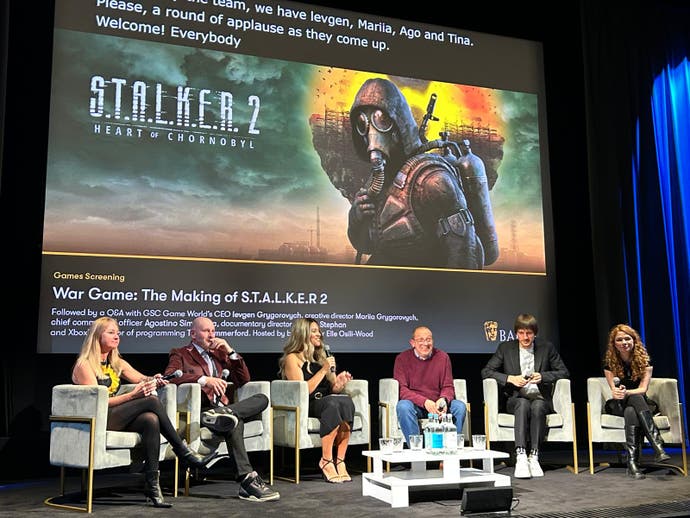Delaying Stalker 2 again not an option, studio says, team worked until it was "broken" by marathon development
Company heads reflect on the game's release and Ukrainian pride.
When Stalker 2, from Ukrainian developer GSC Game World, was released last month after multiple delays, it sold exceptionally well but received a mixed reaction from critics due mainly to issues with its performance and bugs.
However, another delay simply wasn't an option for the team, which found itself exhausted at the end of a long development during a time of war.
Speaking to Eurogamer this week, GSC Game World studio CEO Ievgen Grygorovych compared the game's development and delays to running multiple marathons. "It's very hard to explain your state when you're in a very intensive work process for many months until release, and you're working over, over, over what you usually can do and in the highest possible stress and overwhelming period," he said.
"You have no energy at all and you decide - should we take one more marathon? And you just can't say yes, let's make one more marathon, because you're already broken."
Even with more time to polish the game, there was never a time where everything was fixed, added Grygorovych. And with the end of the year and its key sales period looming, the decision was made to continue on and release Stalker 2 in the best state possible.
"You're so tired that you would just die if you say let's run an additional marathon," said Grygorovych. "We didn't have a chance to say let's do it more. We just had a chance of 'let's do until this moment - the release date - as much as we can'." After that, further patches and story expansions can then always be added, he continued.
I spoke with Grygorovych, and creative director (and his wife) Mariia Grygorovych, after a screening at BAFTA of the documentary War Game: The Making of Stalker 2 (which you can watch on YouTube, above). The film follows development of the game during Russia's invasion of Ukraine. It's a powerful and harrowing watch that provides further context to the game and explains its status as a political piece of art.
In particular, one thread of the film explores the development team grappling with traitorous feelings as they fled Ukraine for their own safety - though other team members did remain in Kyiv to lend support. I had to ask, then: has that feeling changed since the release of the game?
Grygorovych noted the "good response from players from our nation" and the extent of coverage from TV news outlets mentioning the game and the release of its patches. "It's something so unimportant in the scale of the country, but they were talking about the game!" he said.
"It touched everyone in the country, but after releasing this it slightly justified that, yes we left our country and decided not to stay there, but we still made something that could help Ukraine in some way. We are artists, we are creative people, but it was our way to bring value to our country."
He continued: "When you finish the project, you release it and show that it's a good game. And not everyone will love it, that's ok, but for the people who like it we made them happier."

Releasing the game (and the documentary) has helped highlight the plight of Stalker 2's developers, but also raise awareness of the continuing situation in Ukraine at large, Grygorovych continued. "It's very important to remind people what's going on, because when there is something evil and you stop calling it out and mentioning it... it won't help to stop it," he said.
"One layer is we are making the game and we want to entertain people and make it as good a game as possible. And second, it's about what we can do for our homeland, because we are in a hard situation. I would love to stay in my country and live in my country and make games in my country, but it's nearly impossible now."
As such, the only way to develop and release the game was to divide the team and make it work across two offices in two countries - one in Kyiv and another in Prague. Yet Mariia Grygorovych added that had the team remained in Kyiv, it still would've released the game in some form. "I can't imagine that we would give up in this theoretical situation," she said, "because giving up is something not about even our culture. It's hard but you will do it. Why? Because we don't have any options. Why is Ukraine even fighting with big evil Russia? Because we don't have any options."
"I would love to stay in my country and live in my country and make games in my country, but it's nearly impossible now."
Stalker 2 has proven so popular in the studio's homeland that there were countrywide internet issues for five or six hours once the game was released. "It was hard for the whole country and it's a bad thing because the internet is important, but at the same time it's like whoa!" she said.
"For us and our team what's most important is, for some people in Ukraine, they feel a little bit happier than they were before release," she continued. "We did something for our home country, something good for them.
"It's not perfect, we need to fix everything, it has some problems. But it's a game! It's a game with soul, with feelings there, with love there. Even the problems, you can't fix them if you don't have a game."
As for fixing those bugs, Ievgen Grygorovych said doing so was the easy part in comparison to the creative process of making the game itself. Still, it struggled with wanting to release the game in a playable state, and not make matters worse by introducing fixes to some issues that then destablised other parts of the game elsewhere.
Looking to the future, GSC Gameworld's team say they are still adjusting to their new normal, split over two locations and with Ukraine's future still uncertain. Grygorovych believes the studio is now forever changed. "It's like an evolution," he said. "There's no way for evolution to move somewhere in the past... it leads you to the place where we are now and it's impossible to get back to the place that was safer, better, warmer. We are in this state and sadly we can't go back, but we can move forward and we can be better."
Yesterday, Stalker 2 received its third major patch in less than a week, bringing crash fixes and more.
The game's success has also reportedly made it the target of a Russian disinformation campaign claiming it's used to draft players into the Ukraine war.









